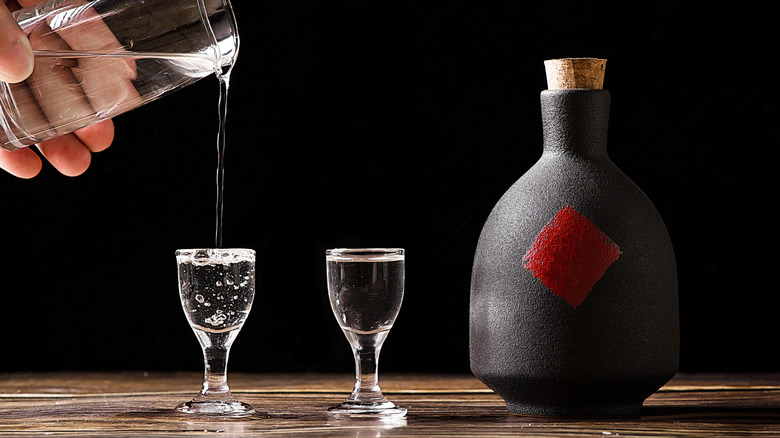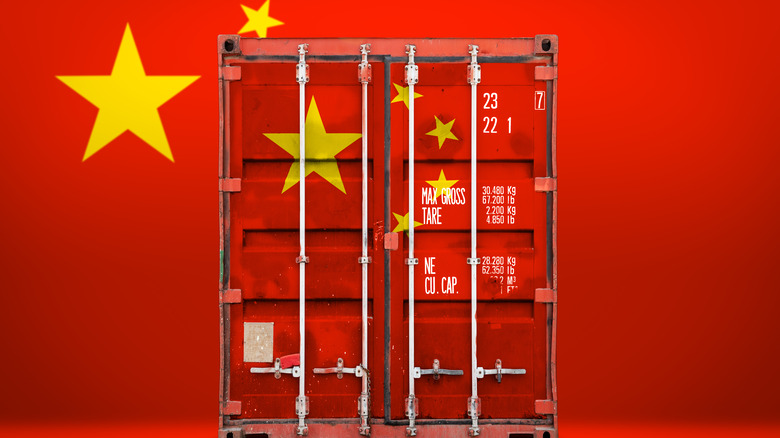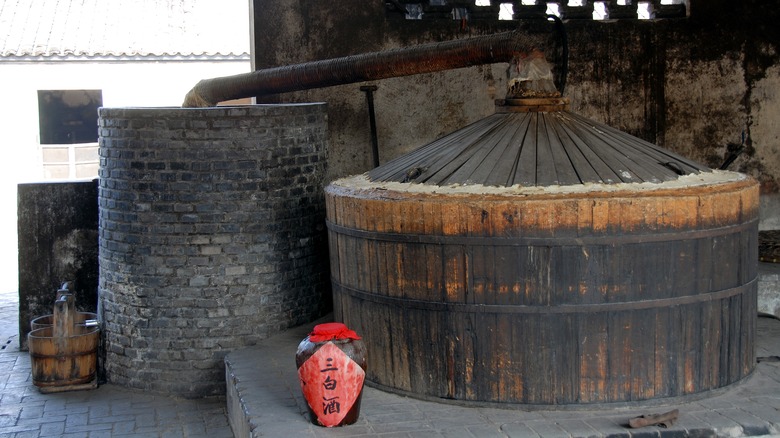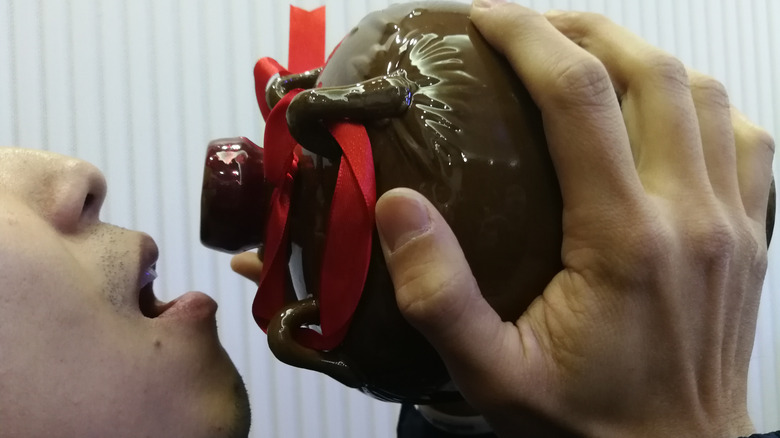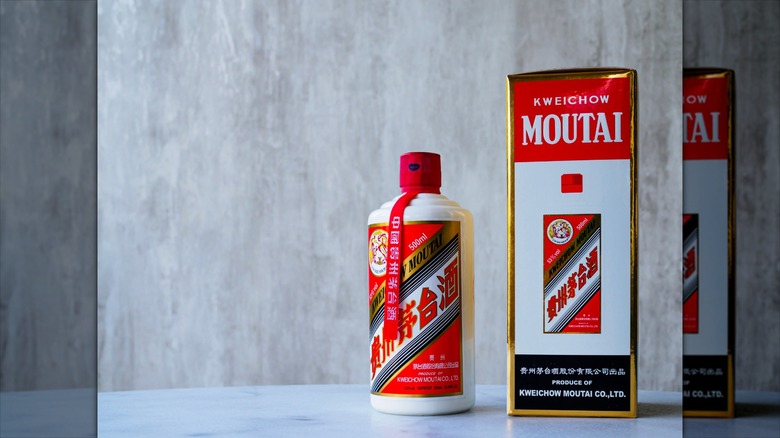What Is Baijiu And How Do You Drink It?
The clear and strong spirit baijiu may be a new trend on cocktail menus in the Western World, but it has a long and rich history in China, dating back thousands of years, and still maintains a strong foothold in Chinese culture today. According to Science Direct, baijiu has been manufactured since before the 2nd century BCE — if not prior; Historical records show that "the earliest distillation tools appeared during the era of the Song dynasty," and one text describes a method "using wheat, barley, sticky rice, etc., to produce a distilled liquor" — a method that has remained the same to this day.
If you've never had the experience of taking a shot of the clear distilled liquor at a Chinese banquet with a scroll of poet Li Bai's infamous Bring the Wine poem hanging on the wall (or even if you have), baijiu isn't just a strong drink that'll burn in your mouth. It's a crucial element of thousands of years of Chinese culture and tradition. Let's explore.
A brief history of baijiu
While jiu or alcohol has been downed and enjoyed by the Chinese for thousands and thousands of years (according to DrinkBaijiu the first jiu made from rice, honey, grapes, and hawthorn fruit appeared between 7000 and 5000 BCE in the Henan Province), baijiu first began spreading throughout China during the years 1644-1948. Depending on where the drink landed, new traditions and variations were born. However a common thread was that baijiu became the preferred drink of the peasants, whereas the elite preferred huangjiu, or yellow wine.
Then in 1949, with the birth of The People's Republic of China, the government began to modernize, standardize, classify, and record techniques for making different styles of Chinese spirits by setting up regional distilleries, paving the way for national baijiu brands to be born and much later on, for baijiu to move on from a drink of the masses to a drink of the elite in China.
How is baijiu made?
In Mandarin, the word "bai" means "white" and the word "jiu" means "liquor," which is a very straightforward description of the alcoholic beverage favored throughout China.
According to c&en, baijiu is made from fermenting cooked sorghum with a yeast starter called jiu qu, which is essentially a "brick of crushed wheat, barley and sometimes peas." From there, yeast and fungi spawn under the correct temperature and humidity conditions, and once they make contact with the sorghum grains, enzymes are secreted, macromolecules break down and creates the distinctive baijiu flavor, along with ethanol.
Be warned, however. Baijiu is strong, and as explained by China Live, it typically has an ABV (alcohol by volume) of 80% to 120%. So it's not for those who are either new to drinking, or have a low tolerance for alcohol. The outlet also said that Moutai is one of the most popular brands of baijiu.
What does baijiu taste like?
Baijiu certainly has a distinct flavor, and it's one that's hard to put down into words. From personal experience, it tastes like the fiery fury of the disappointment of my ancestors dancing on my tongue, but Westerners have described it as "funky, with a rotting, sweet fruit flavor and a touch of nuttiness." Some baijiu emit a scent that reminds a seasoned nose of soy sauce, but it all really depends on the type of baijiu you have on the table. The variety of baijiu stems from the different mixes and qualities of the yeast used to ferment the alcohol, or the aforementioned jiu qu, or just qu.
Baijiu is not a specific spirit but one that can take on many forms, smells, and subtle colors. The JiangJi Distillery classifies the types of baijiu into 13 categories: strong aroma, light aroma, a hybrid xiao-qu light aroma, sauce aroma, rice aroma, phoenix aroma, mixed aroma, chi aroma, sesame aroma, medicine aroma, extra-strong aroma, special aroma, and laobaigan aroma.
How to drink baijiu without losing face
Favored by the elite and businesspeople looking to impress due to it's high price tag, Moutai, the world's biggest spirit brand, can be priced anywhere from $127 to $20,000 a bottle (via South China Morning Post). This is, after all, the brand that Nixon infamously cheers'd Premier ZhouEnLai with on his 1972 visit to China.
Doing business in China has a reputation for being intense: Traditions have had it that a dinner out with colleagues practically requires baijiu-drinking and there are even anecdotes of subordinates drinking on behalf of their boss — all of this to save face because to lose face, or diu lian, is a cultural faux-pas that loses one self-respect. Quartz offers an entire guide on business drinking in China, noting that when one is out drinking with friends or family, the pressure to drink is not as intense.
If you do find yourself face-to-face with a Chinese Uncle that keeps pouring you shot after shot, make sure to eat a lot of food, drink water, and remember: You can sip your shot of baijiu slowly. Otherwise, head to your local trendy cocktail bar and simply order one with the latest spirit, and sip with the wise knowledge that you're imbibing thousands and thousands of years of Chinese history and culture.
